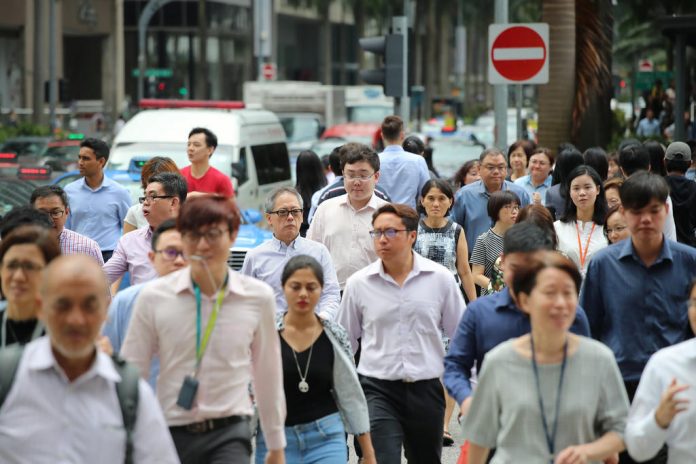Real wages in Singapore grew 0.4 per cent in 2022, lower than the 1.6 per cent in the preceding year, the Ministry of Manpower (MOM) said on Monday. The pace of real wage growth last year was “significantly dampened” by inflation. The inflation rate in 2022 was 6.1 per cent, higher than the 2.3 per cent recorded in the preceding year.
Last year was the smallest increase in real wages since 2012, when real wages fell by 0.4 per cent. Nominal total wages – including employers’ Central Provident Fund (CPF) contributions – of full-time resident employees who had been with the same employer for at least one year rose by 6.5 per cent last year. Nominal total wages do not take inflation into account. The 6.5 per cent increase in 2022 was “significantly higher” than the 3.9 per cent in 2021, and last year’s was the highest in a decade. “This reflected the efforts by firms to restore wages of some employees who experienced wage cuts during the pandemic years, as well as give higher wage increases to other employees to retain staff amidst competition for workers,” said MOM.
Nearly three in four establishments in Singapore gave wage increases as business activities picked up last year. “As the Singapore economy continued to grow in 2022, there was a strong increase in the proportion of profitable firms. As a result, more firms were able to raise their employees’ wages in 2022 compared to 2021,” said the ministry. The proportion of profitable establishments rose for the second consecutive year to 83.9 per cent in 2022. The proportion of establishments that gave wage increases rose from 60 per cent in 2021 to 72.2 per cent in 2022. This was slightly higher than the pre-pandemic level of 69.2 per cent in 2019, noted MOM.
Among establishments that gave wage increases, the magnitude of increase was larger in 2022 compared with 2021. Those that cut the wages of their employees remained in the minority at 5.2 per cent, said the Manpower Ministry. Among them, the magnitude of wage cuts was also smaller in 2022 than in the preceding year. The remaining 22.6 per cent of firms left the wages of their employees unchanged.
HIGHER WAGE GROWTH ACROSS ALL INDUSTRIES
Last year, all industries saw higher wage growth compared with 2021, but the magnitude of increase varied. Accommodation and retail trade sectors registered above-average wage increases at 9.7 per cent and 6.7 per cent respectively. Companies in this sector raised wages to attract and retail workers amid a strong recovery in tourism demand. The financial services, information and communications, and professional services sectors continued to register strong wage increases in 2022, alongside sustained manpower demand in these industries. Firms in manufacturing and wholesale trade sectors also raised the wages of their employees, but to a lesser degree as a result of global supply chain disruptions and weakness in trade-related activities.
TOTAL WAGE GROWTH TO MODERATE IN 2023
Based on recent polls on wage expectations conducted in the first quarter of this year, more firms expressed an intention to raise the wages of their employees in March this year, compared with December last year. “However, against the backdrop of the global economic slowdown and a more uncertain business environment, firms are likely to take a cautious approach regarding salary increments,” said MOM. In April, the Monetary Authority of Singapore (MAS) said it expects core inflation to remain elevated over the next few months as businesses continue raising prices at a firm pace to pass on cost increases. But core inflation will remain on a “broad moderating path” and should slow more discernibly in the second half of this year, MAS said.
The Manpower Ministry said total nominal and real wage growth are expected to moderate in 2023. “To remain competitive and resilient amidst these global developments, we encourage firms and workers to press on with business and workforce transformation, and make full use of government programmes to adapt to the changing environment,” said the ministry. “The government also encourages all firms to implement the Flexible Wage System as the uncertainties ahead continue to underscore the need for resilience and flexibility in wage structures.”
CNA




















